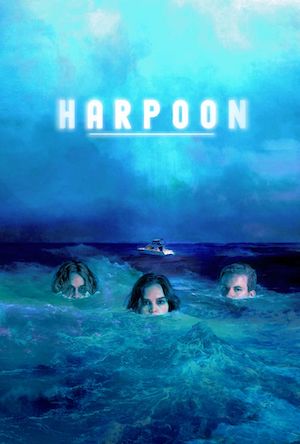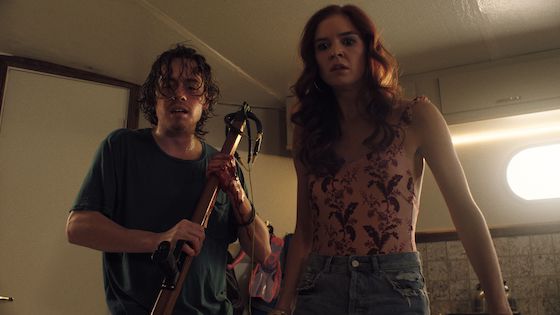

[Rating: Solid Rock Fist Up]
Rob Grant‘s new movie Harpoon (out on VOD now), is basically just an adaptation of an event in the Edgar Allen Poe novel, The Narrative of Arthur Gordon Pym of Nantucket, at least in terms of the plot. It’s so obvious that on the characters, Sasha (Emily Tyra) even goes so far as to mention it.
“Rivalries, dark secrets, and sexual tension emerge when three best friends find themselves stranded on a yacht in the middle of the ocean desperate for survival. With plenty of alcohol and very little food and water, emotions run high and their delusions become a reality. As the days stretch on and death seems inevitable, their terrifying truths float to the surface.”
The plot of Grant’s Harpoon is basic, but the story is really just an abstraction on which to hang a lot of other things. Take the title: there’s no actual harpoon. It’s a spear gun, a point which is, again, mentioned repeatedly by the characters. I swear, at any point in the movie, I actually expected either Jonah (Munro Chambers) or Richard (Christopher Gray) to address the camera directly, because – honestly – one of them is named JONAH and the other is named Richard PARKER, which is the name of the character in the Poe novel who draws a short straw and is eaten by his shipmates while stranded at sea.
However, there isn’t any breaking of the fourth wall, at least in that fashion, because we have a narrator. The inimitable Brett Gelman provides commentary on the actions, throws us some facts regarding the past goings-on between Jonah, Richard, and Sasha, as well as their individual histories and some factual tidbits which might have some bearing on the story taking place on screen.
It’s Gelman’s narration, set to fuzzy or grainy black and white 4:3 footage, which provides the comedic heart of Harpoon, which – left to standard narrative flow – could easily have become a tiresome prospect. These are young adults who are, at heart, kind of terrible people, and despite some charmingly snarky dialogue, it’s fairly easy to root for any of them to be the ones to draw the short straw, at least at first.

As Grant’s film unreels, whomever you might be rooting for changes based on the circumstances. Richard is presented as the villain from the get-go, and for the better part of Harpoon‘s first third, you’re wondering why either Jonah or Sasha have anything to do with him, aside from the fact that the poor little rich boy has a boat (the insufferably-named The Naughty Buoy) and scads of cash.
What’s appreciable about the way Grant and Mike Kovac‘s script works is that they don’t present these characters as idiots. They’re sharp, if prone to rashly terrible in-the-moment decisions, but if nothing else, each of them has the number of either the other two characters. A scene in which everything comes out in a round robin of cajoled confessions is played for maximum “Ah hah!” effect, and the interplay between the various pairings allows for alliances which shift at a moment’s notice.
I’d kill to see this staged as a small black-box theatrical performance. Take Gelman’s narrator and have him walk around the audience, relating the backstory and factual tidbits as video is projected on a wall somewhere. Have the audience feel as closed in as the protagonists, and play the sound of the ocean washing against the sides of the boat constantly, reinforcing the isolation, and really make this feel as small as it is.
Harpoon is mean, but it works so well because any viewer willing to join in the fun and abandon any affection and roll with the literal and metaphorical punches as their perspective and assumptions are forced to switch will be rewarded time and again with surprises that are delightfully dark.





Comments on this entry are closed.